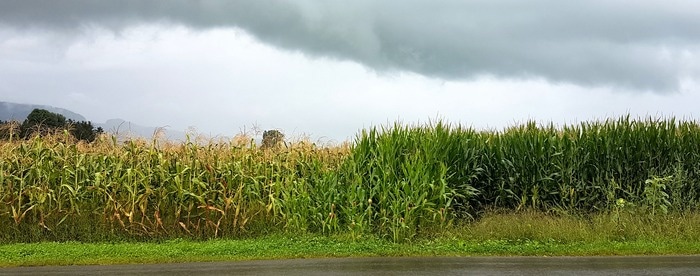Reviewed by Emily MageeDec 1 2022
According to a recent study published in PLOS Biology on November 29th, 2022 by Samuel Wuest of the University of Zurich and Agroscope, Switzerland, and colleagues, a clear and simple breeding experiment combined with genetic analysis can quickly uncover genes that promote cooperation and higher yields of plant populations.
 A century of breeding progress has improved maize varieties such that they can be more effectively packed into high-density fields, thus increasing yields per crop area. Neighboring fields of the Swiss traditional maize landrace “Rheintaler Ribelmais” (left) and a modern elite variety (right). Image Credit: Samuel Wuest (CC-BY 4.0, https://creativecommons.org/licenses/by/4.0/)
A century of breeding progress has improved maize varieties such that they can be more effectively packed into high-density fields, thus increasing yields per crop area. Neighboring fields of the Swiss traditional maize landrace “Rheintaler Ribelmais” (left) and a modern elite variety (right). Image Credit: Samuel Wuest (CC-BY 4.0, https://creativecommons.org/licenses/by/4.0/)
Through conventional breeding techniques, the outcomes have the potential to quickly increase crop productivity.
According to traditional evolutionary theory, when individuals compete, those who possess the genes that are most advantageous to them produce more offspring than those winning genes. Plant breeders are faced with the challenge of choosing plants that collaborate rather than compete as a result.
Individuals who refrain from growing too tall or spreading their leaves out too wide in a dense monoculture stand of corn or wheat may be able to increase overall yield (the “Green Revolution” of the mid-20th century was heavily reliant on the initiation of dwarfing alleles into major cereal grains).
Although it is difficult to identify the alleles (individual variations of genes) that may foster cooperation, the authors created a system to do so.
According to game theory, the authors reasoned that the most cooperative genotype will perform best when its neighbors are also cooperative but will perform poorly when it encounters selfish, fiercely competitive neighbors.
They compared a plant’s performance when grown with another genetically similar individual (modeling a monoculture) to its performance when grown with a set of "tester" genotypes, which varied in their growth strategies, using the model plant Arabidopsis.
They could see which plants maximized both the capacity for rapid growth and the capacity for cooperation with genetically similar individuals so that their neighbors also grew well by calculating both the overall vigor of each plant (as measured by above-ground biomass) and the difference between its growth in the two situations.
They used published genome-wide polymorphism data and those results to identify the genes linked to the cooperative trait. They discovered that it was most strongly linked to a small collection of related polymorphisms, and in particular, a minor allele at one gene.
In comparison to plants carrying the major allele at the same locus, plants with that minor allele produced 15% more biomass when grown in close proximity and at a high density. Reduced root competition coexisted with the cooperative effect; consequently, nearby plants may have expended less energy invading one another's root zones in search of nutrients.
The same comparative method could be applied to find cooperative alleles for any measurable trait, according to Wuest.
Such variation, once identified in a crop, could rapidly be leveraged in modern breeding programs and provide efficient routes to increase yields.”
Samuel Wuest, Scientist, Agroscope
Wuest added, “The ideas that inspired this work are not new, many have in fact been formulated decades ago. And yet, the thought that we humans, one of the most cooperative species, can profit from making our crops more cooperative, too, still intrigues us today.”
Source:
Journal reference:
Wuest, S., et al. (2022). Increasing plant group productivity through latent genetic variation for cooperation. PLOS Biology. doi.org/10.1371/journal.pbio.3001842